Primate of the Russian Orthodox Church participates in the Paschal reception at the Ministry of Foreign Affairs of Russia
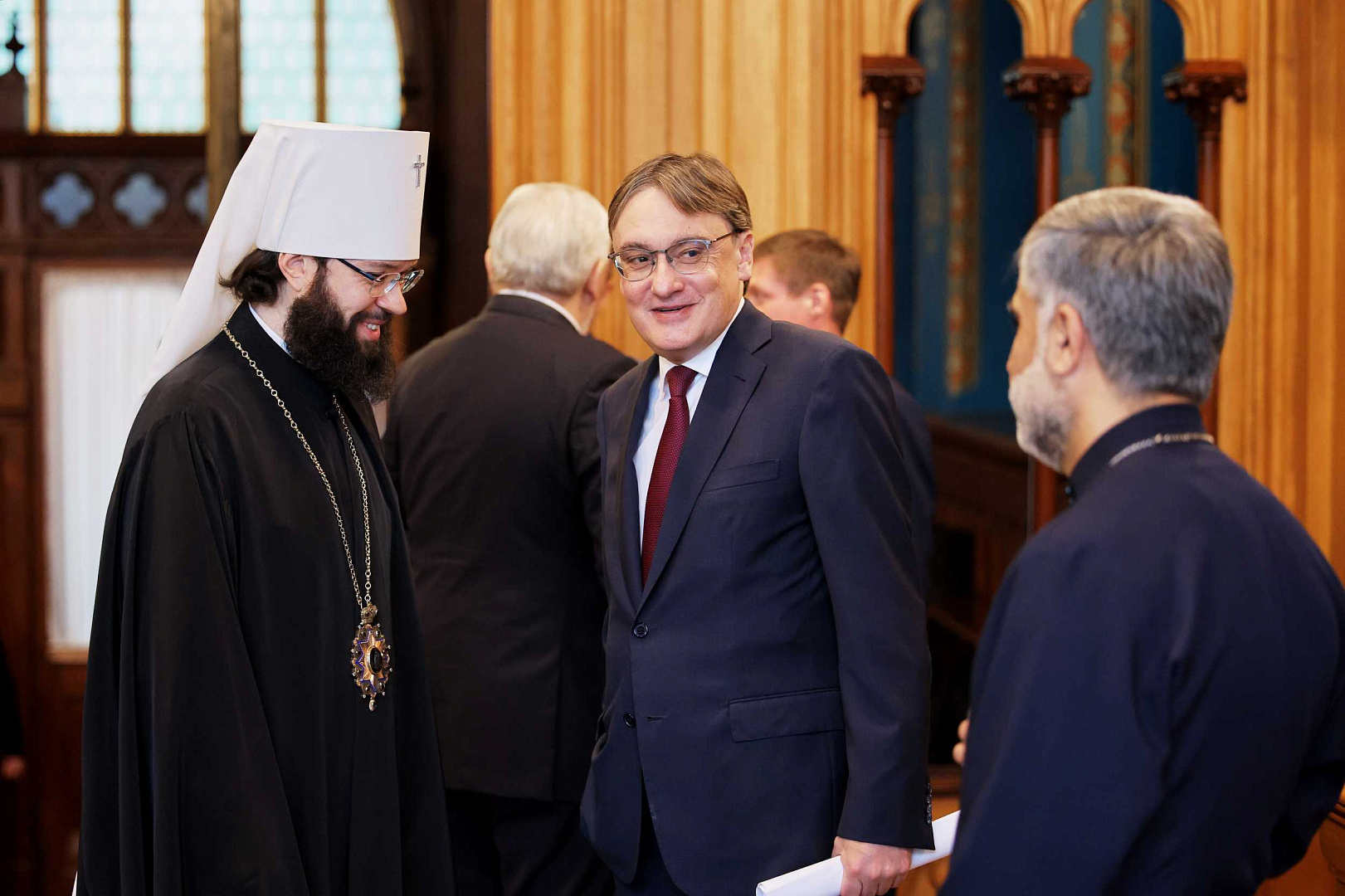
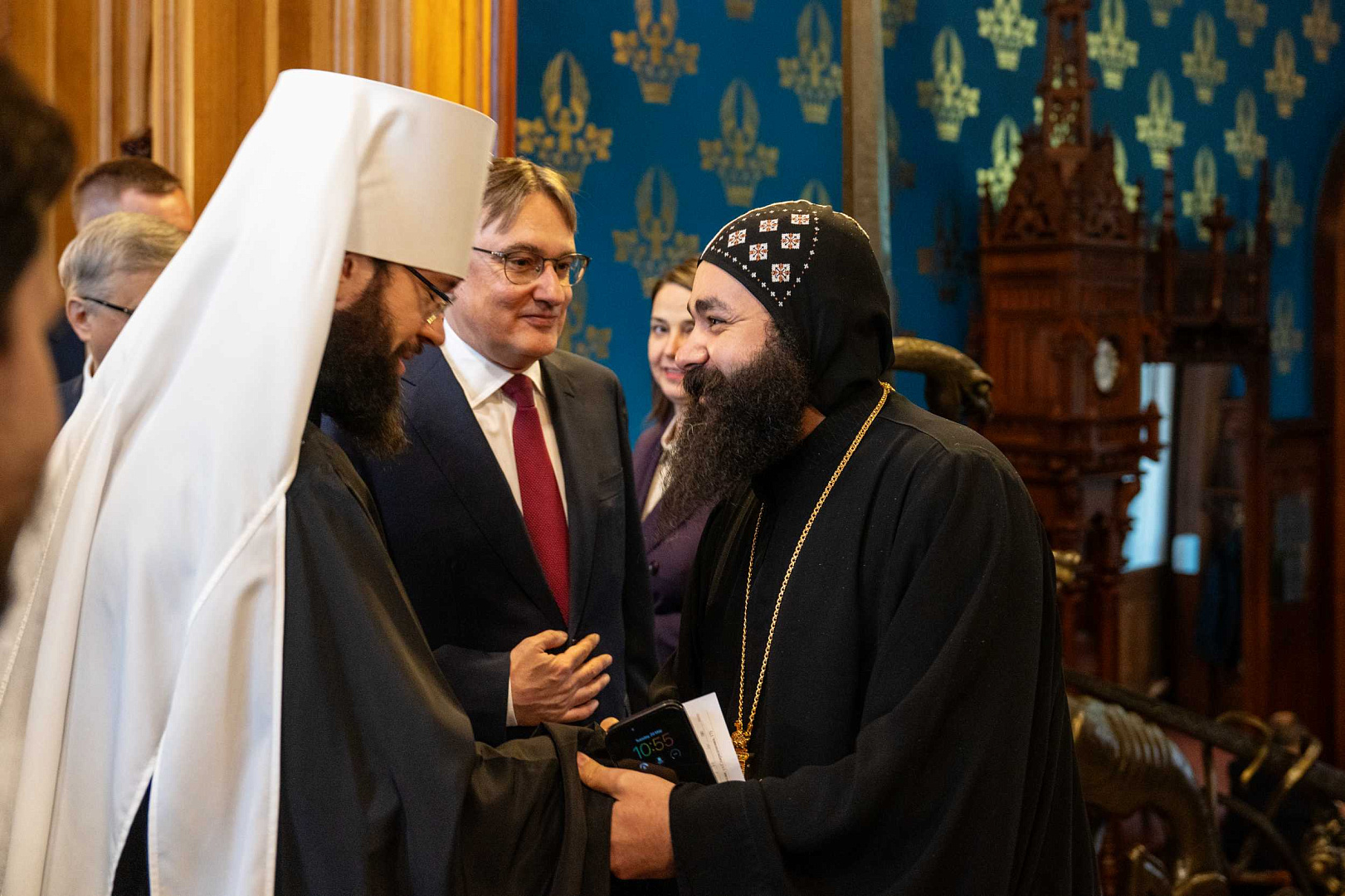
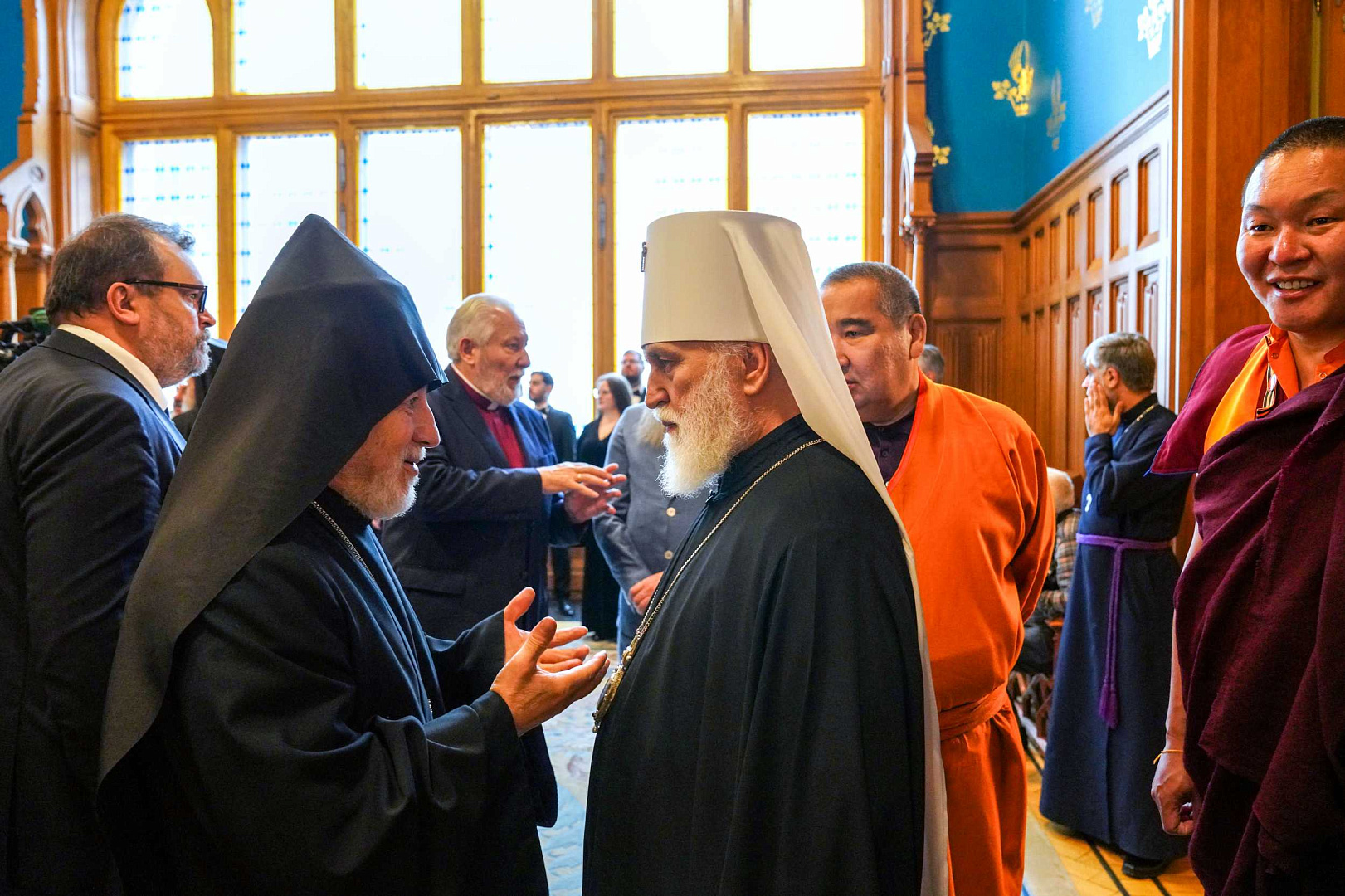
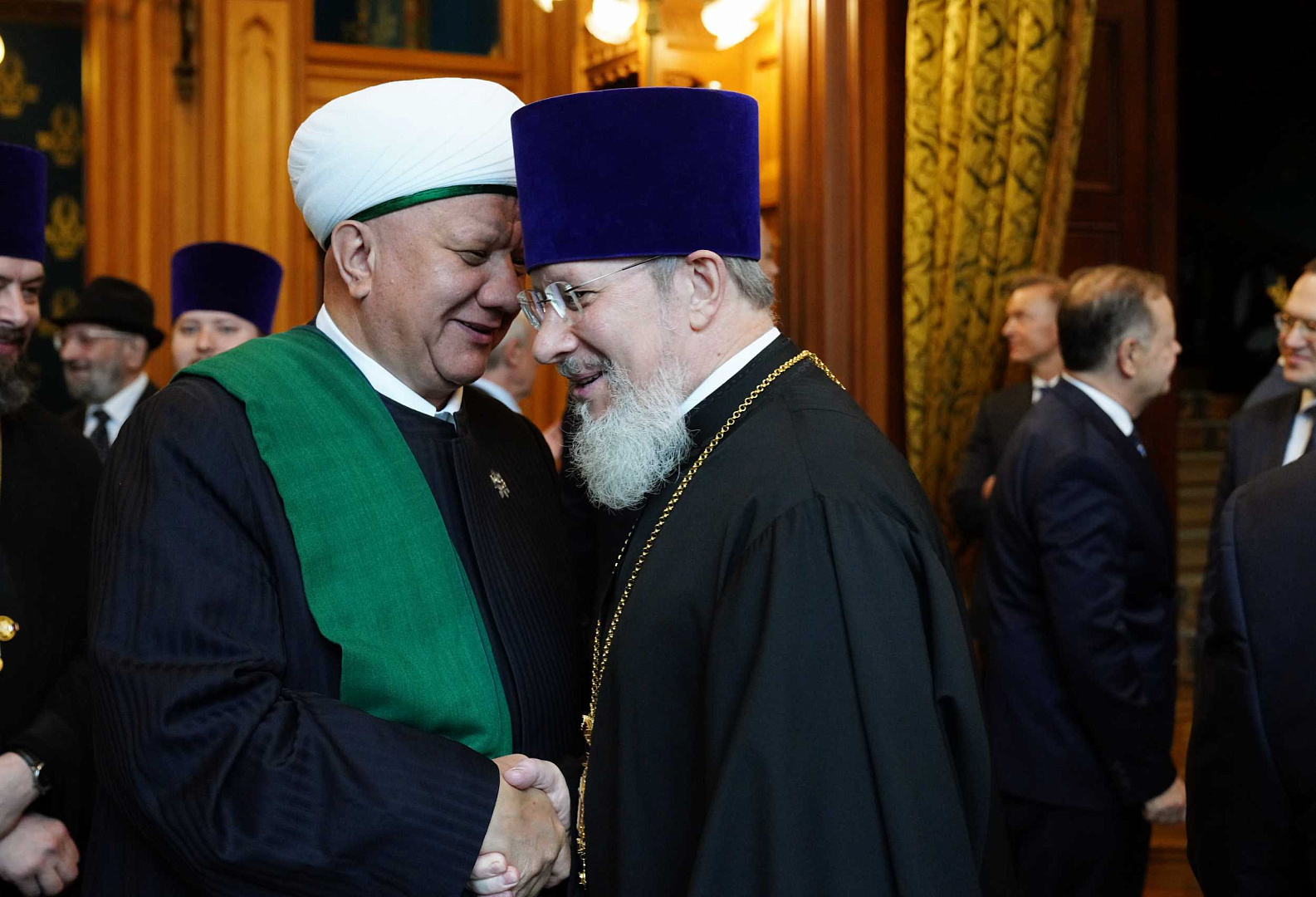
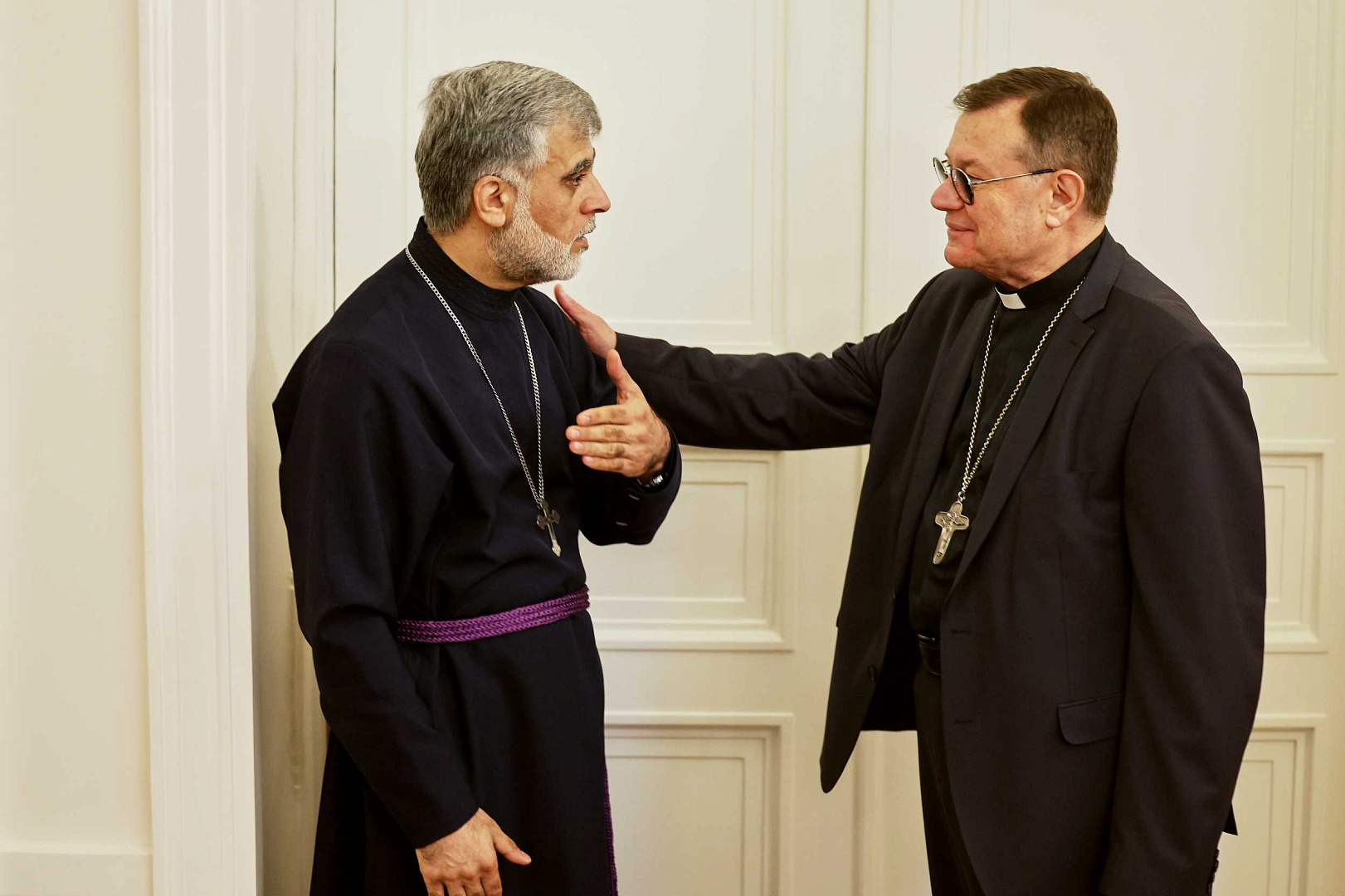
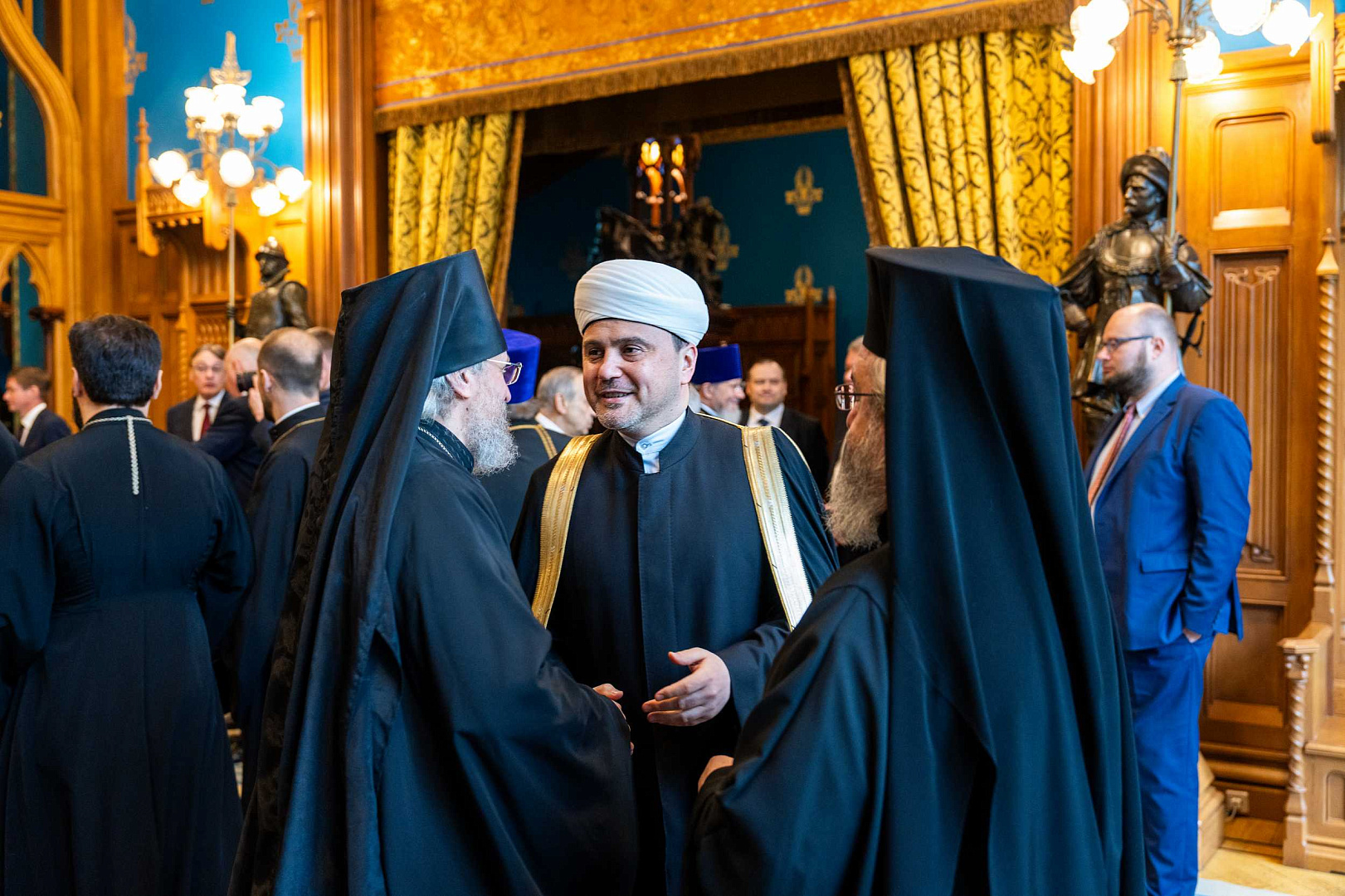
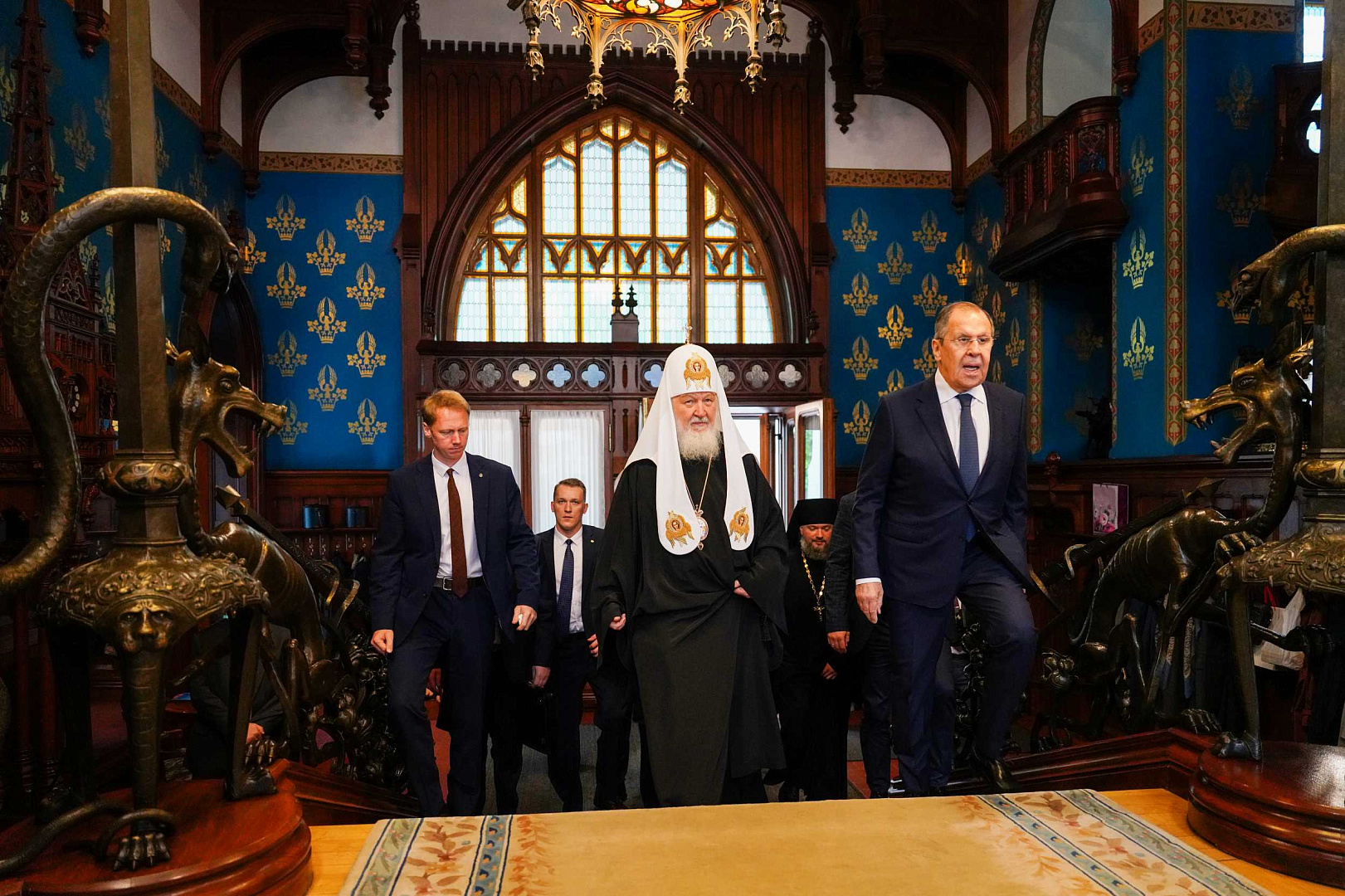
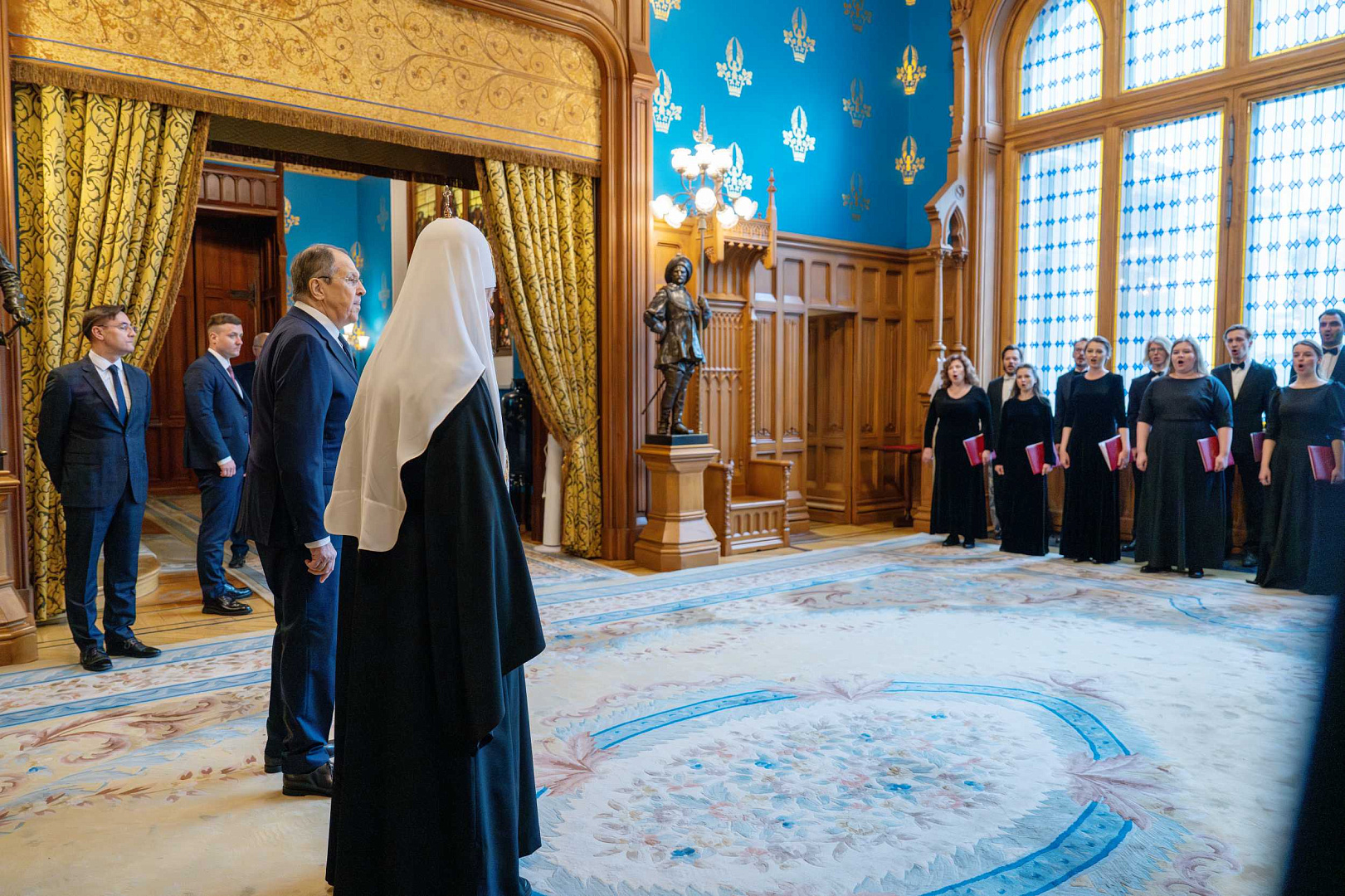
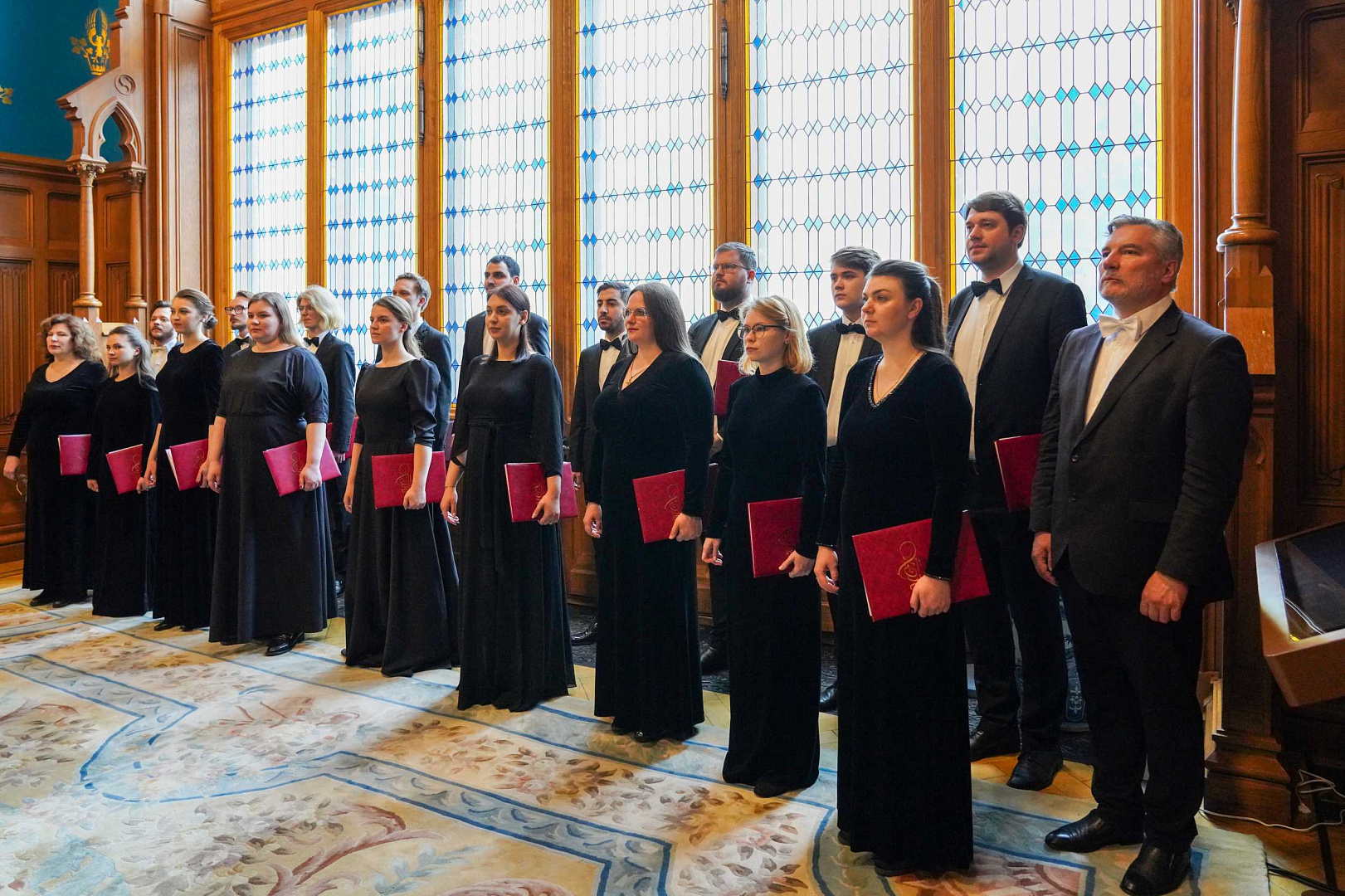
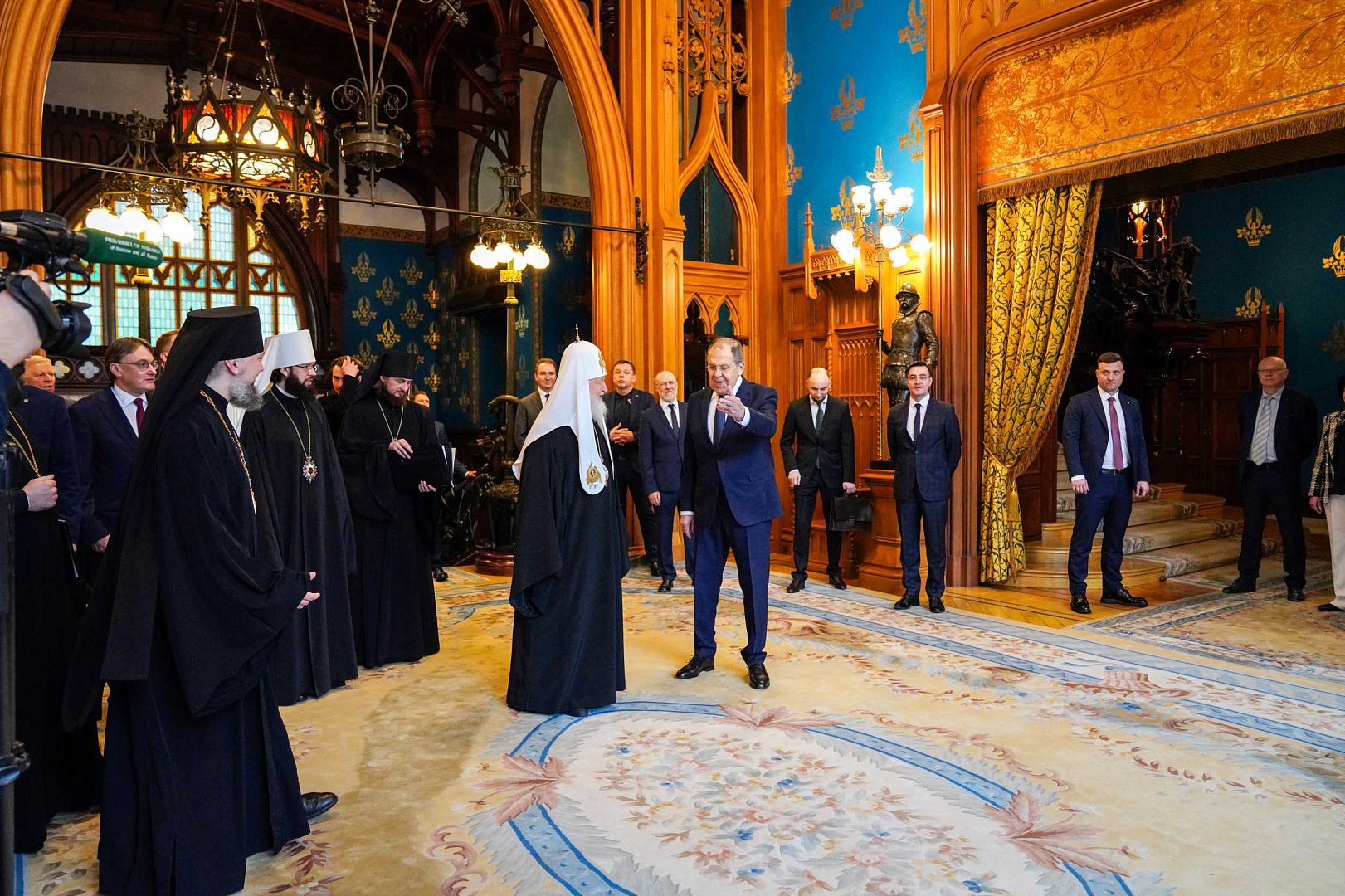
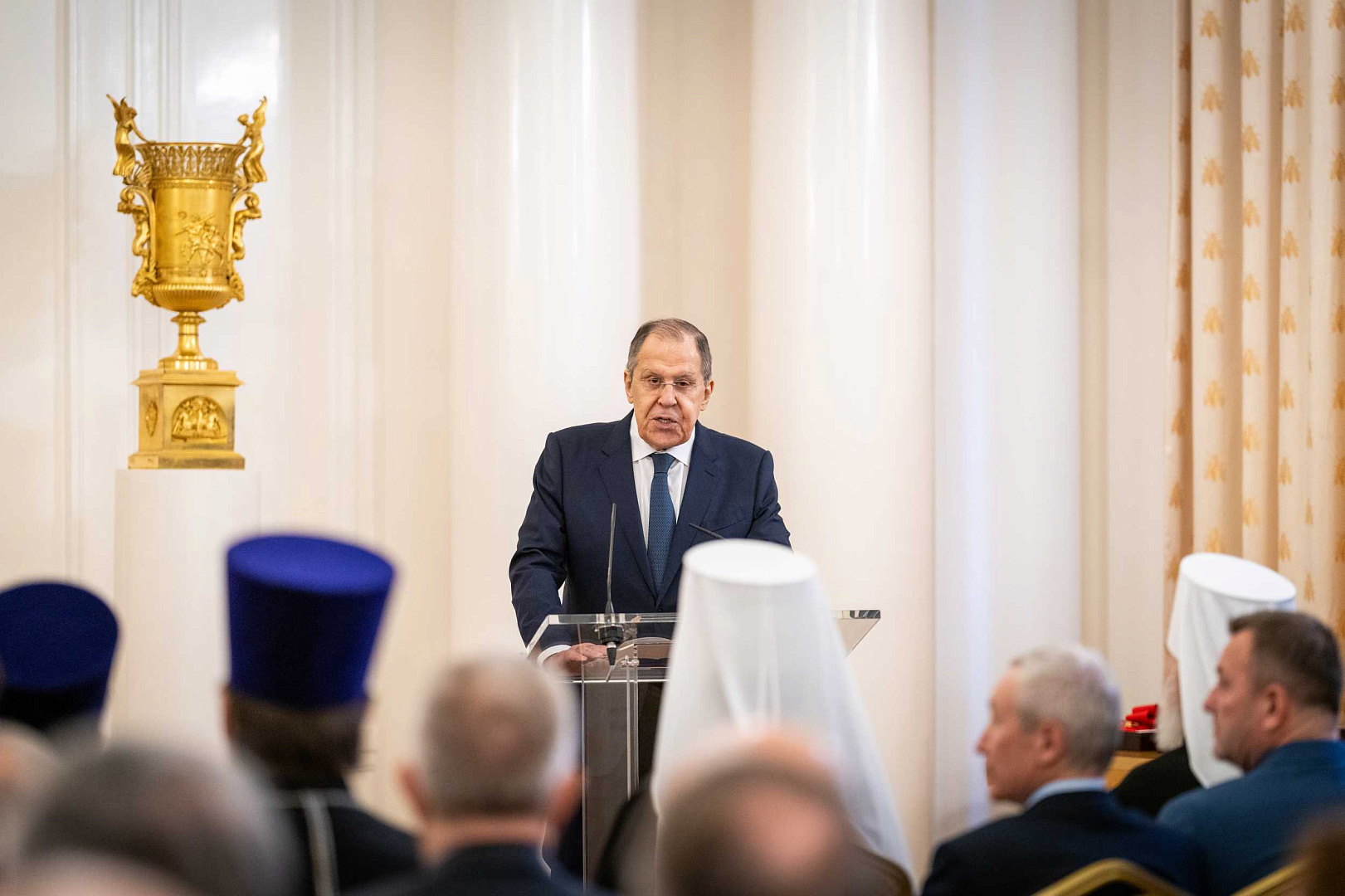
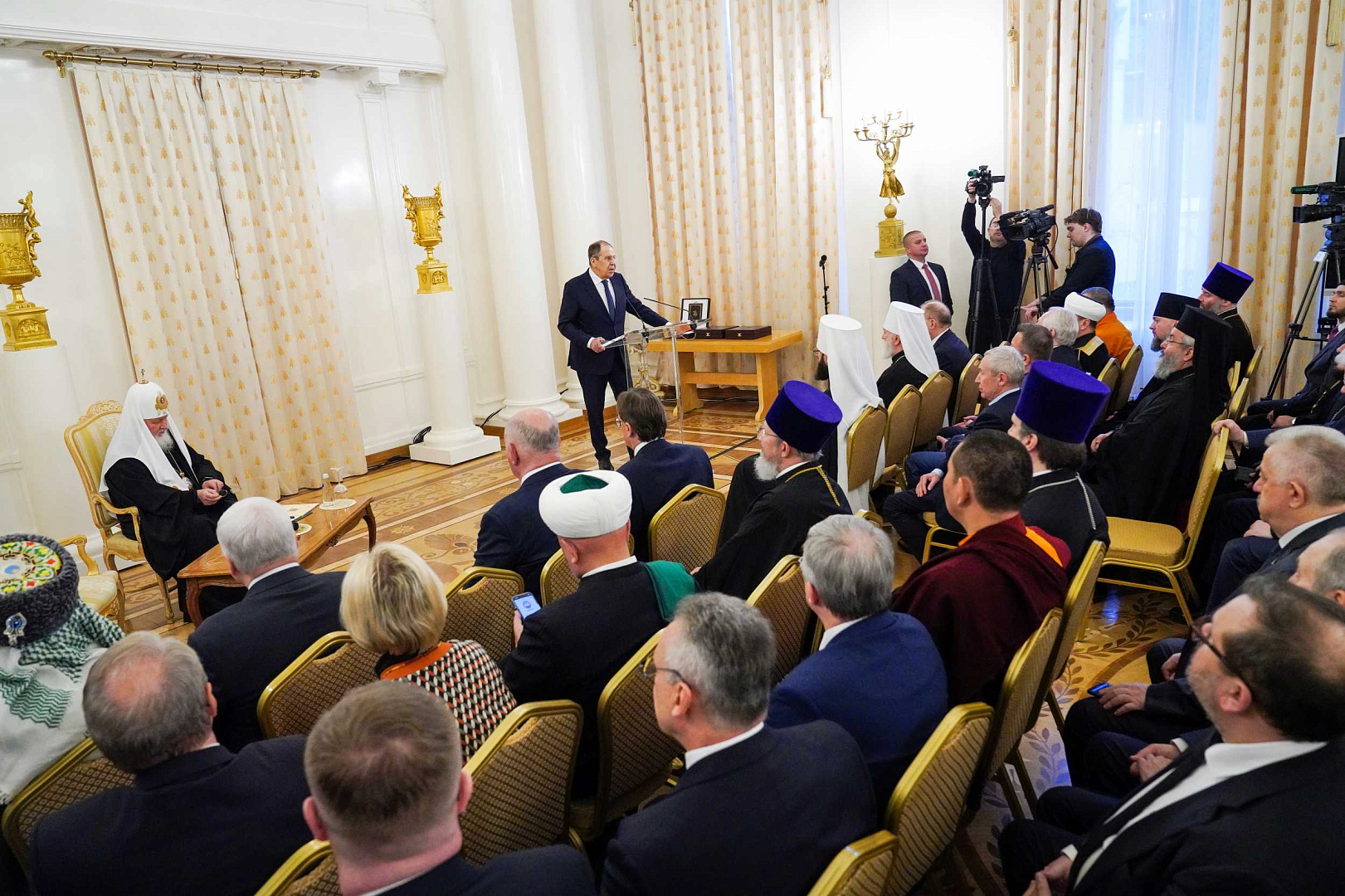
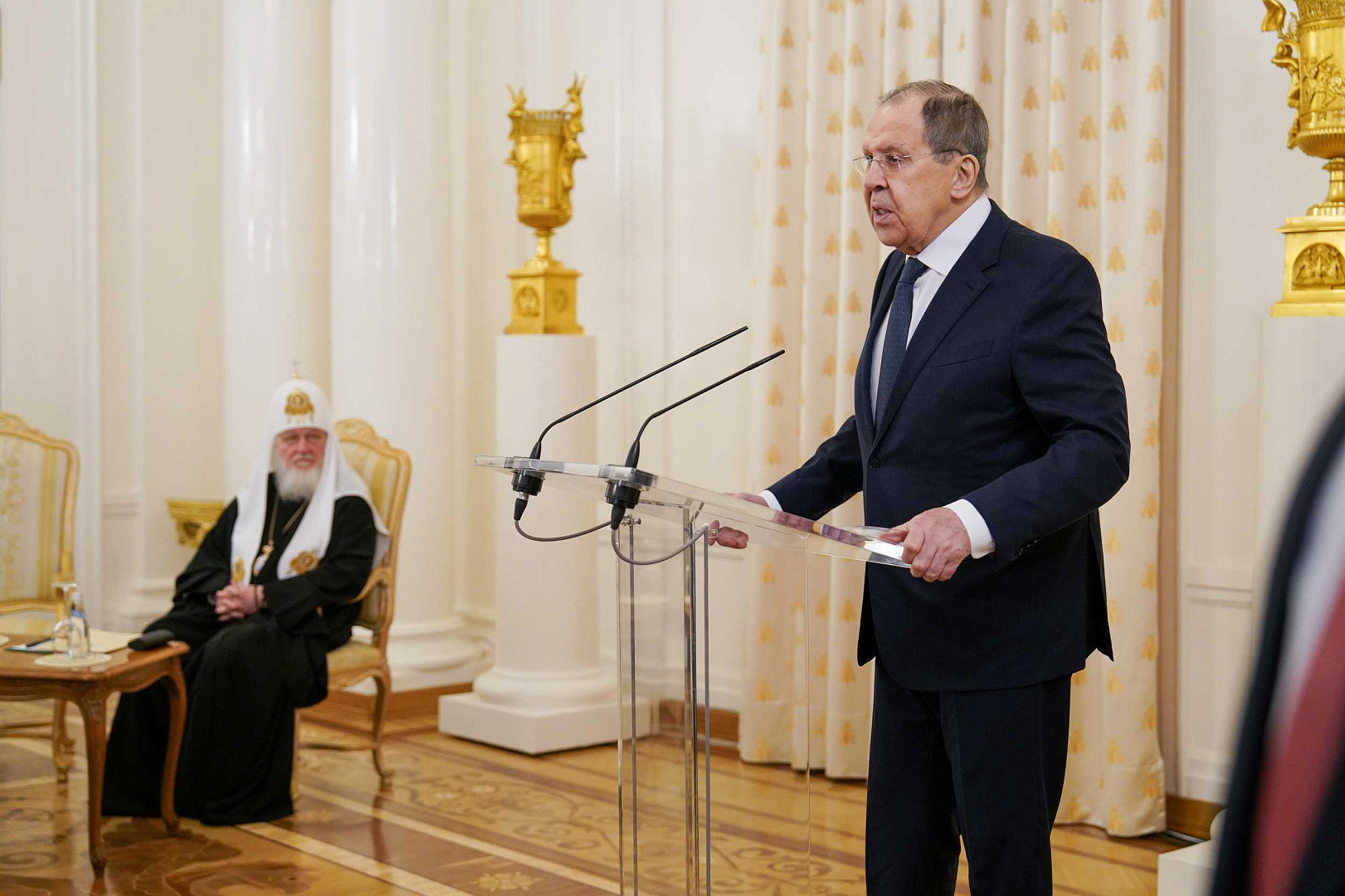
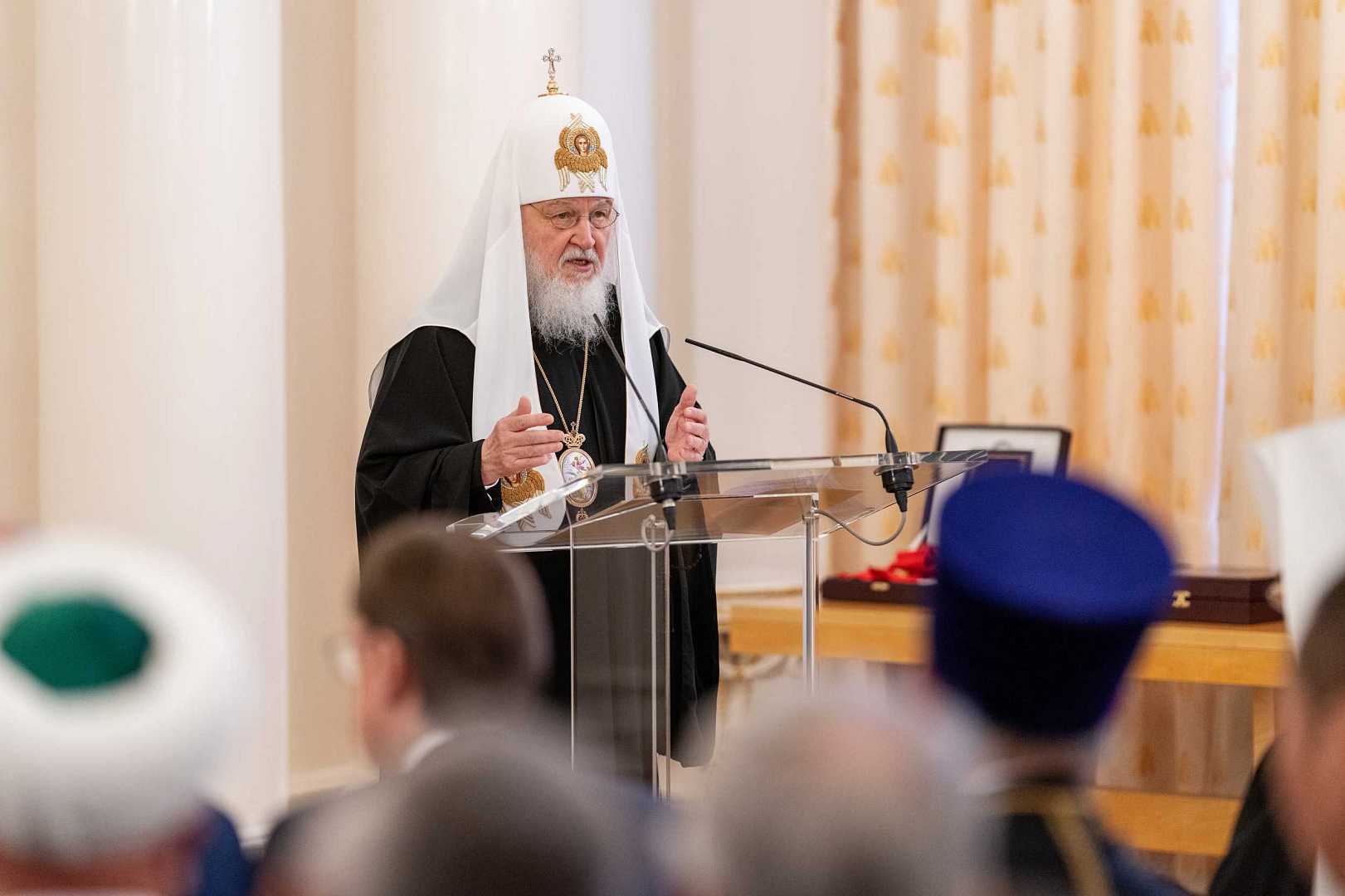
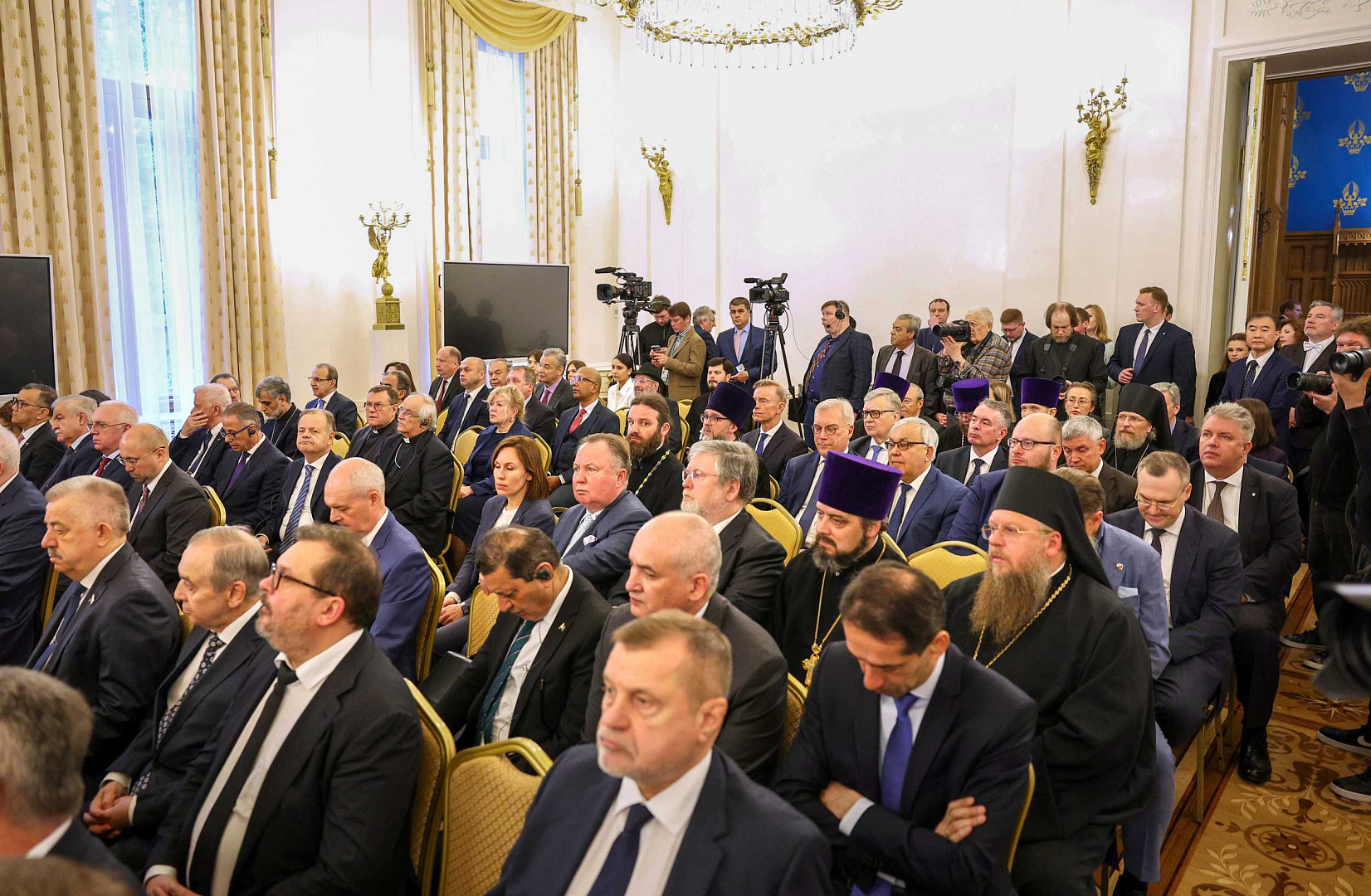
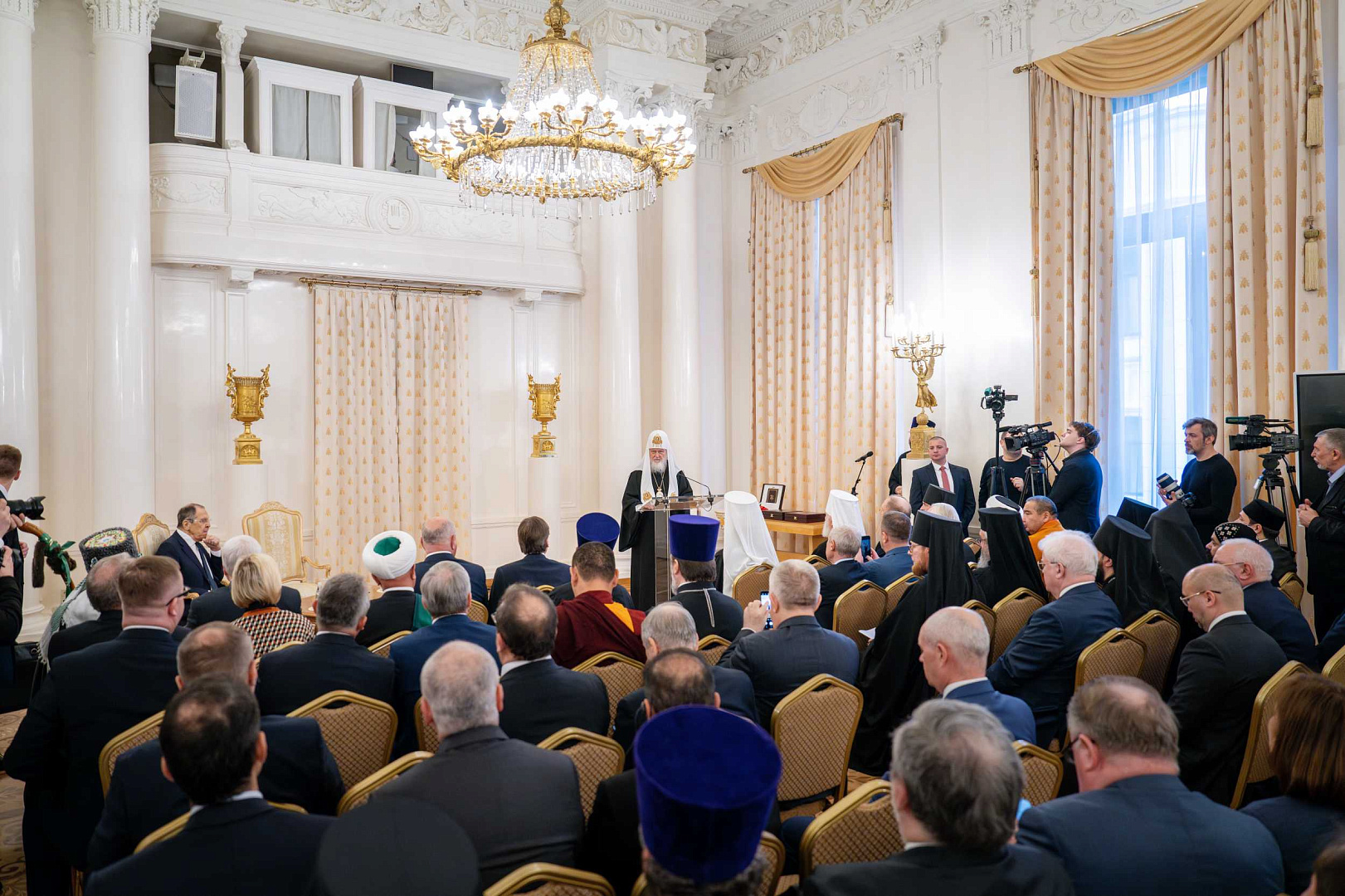
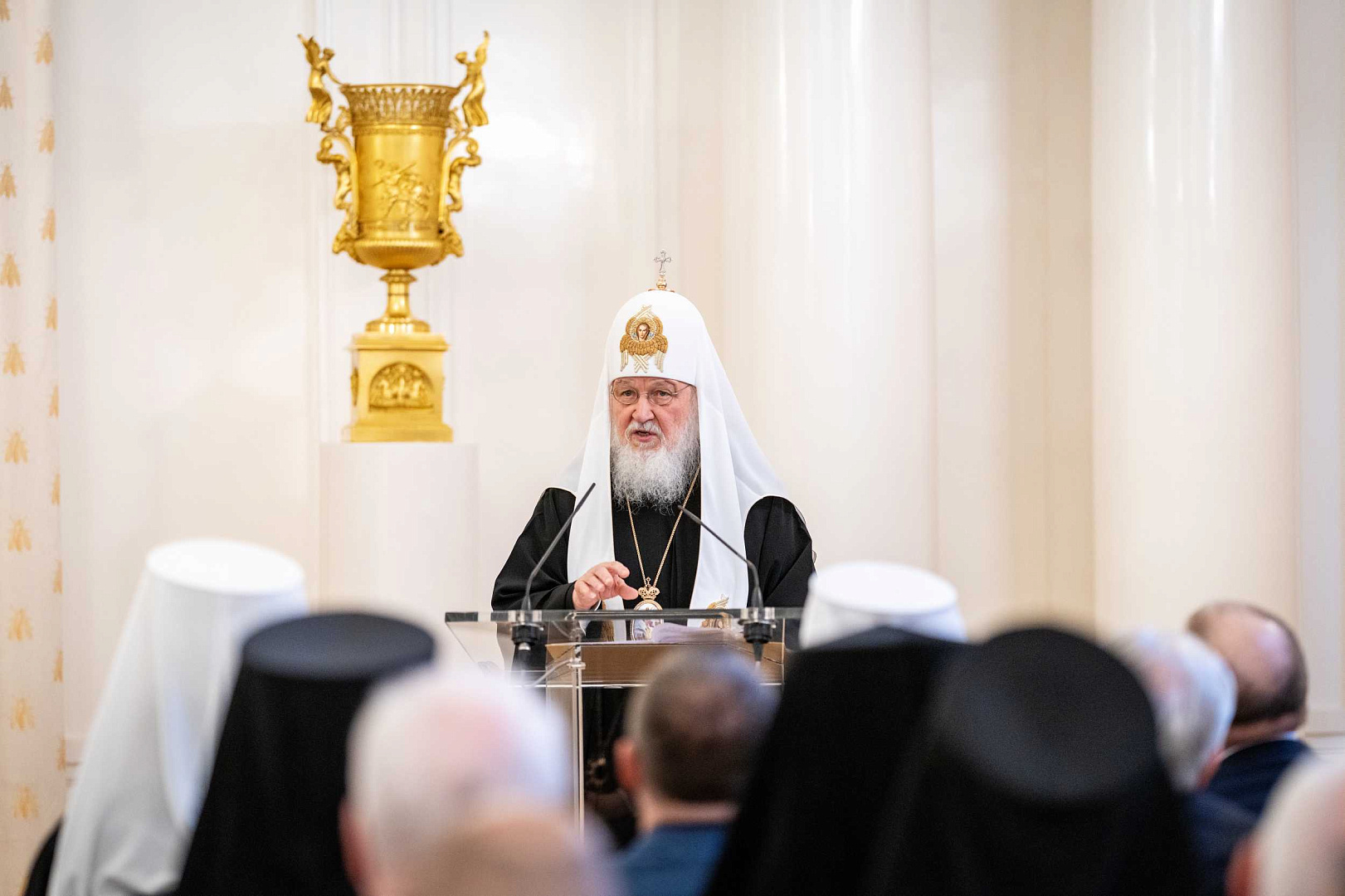
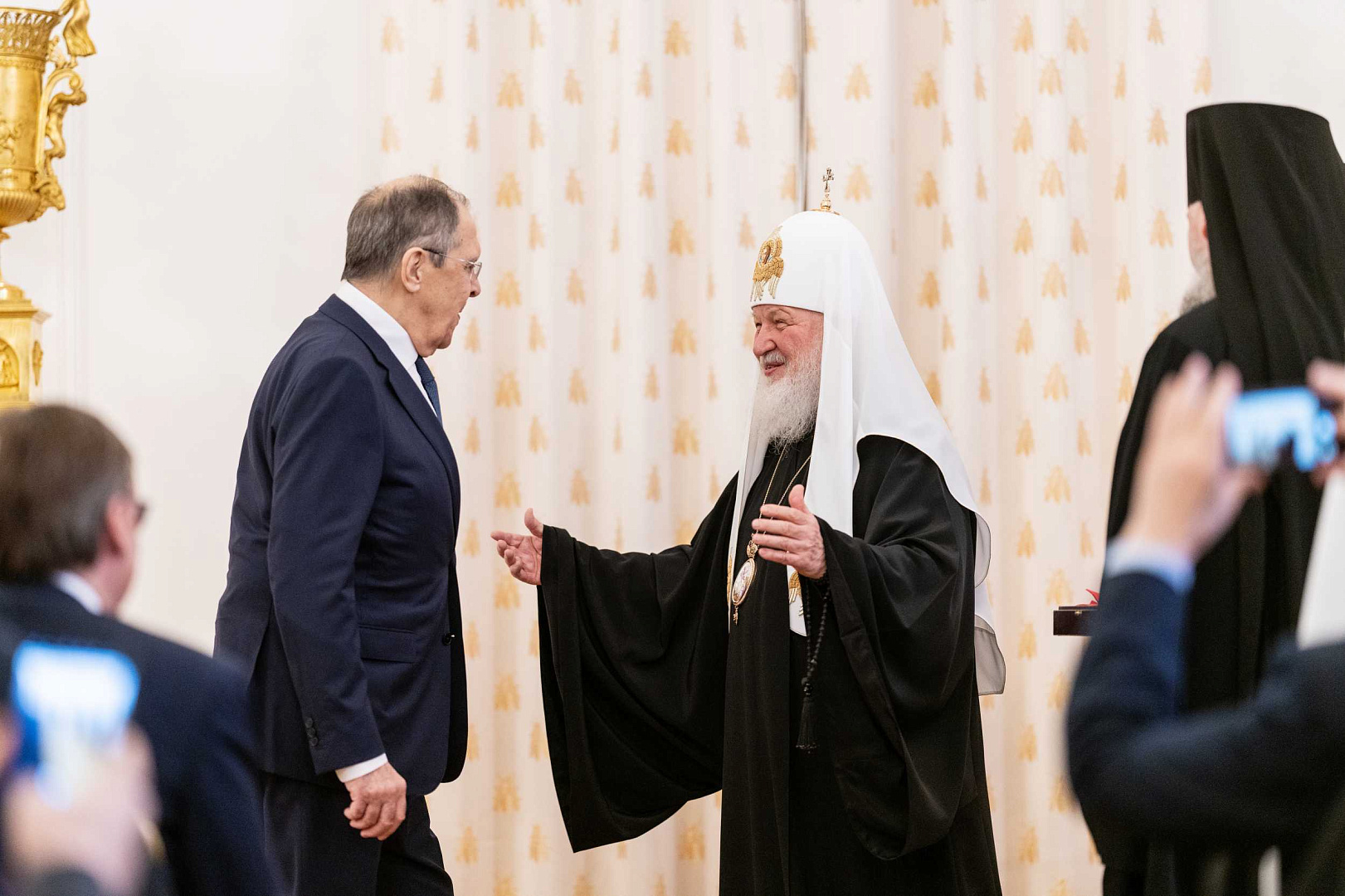
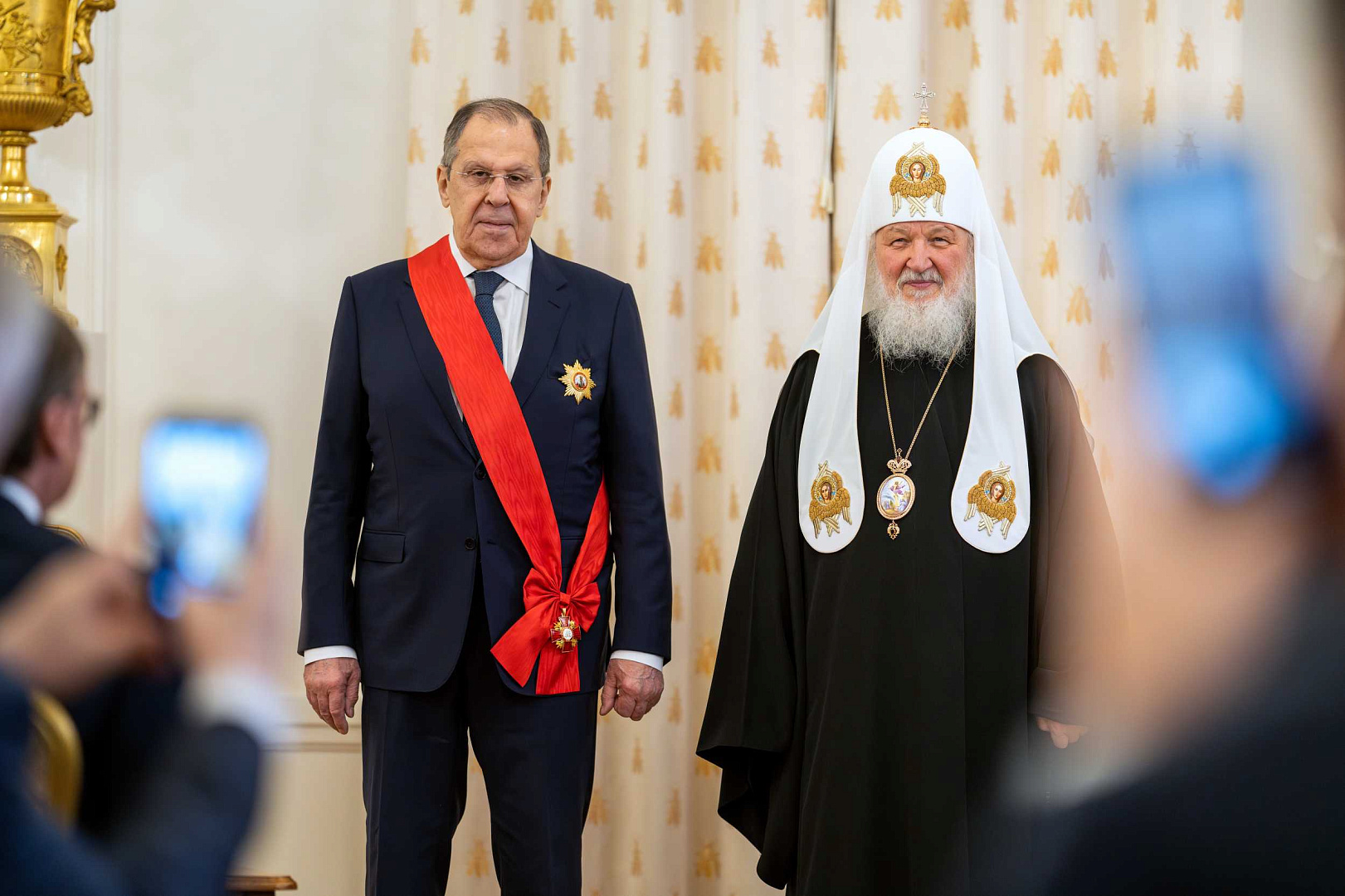
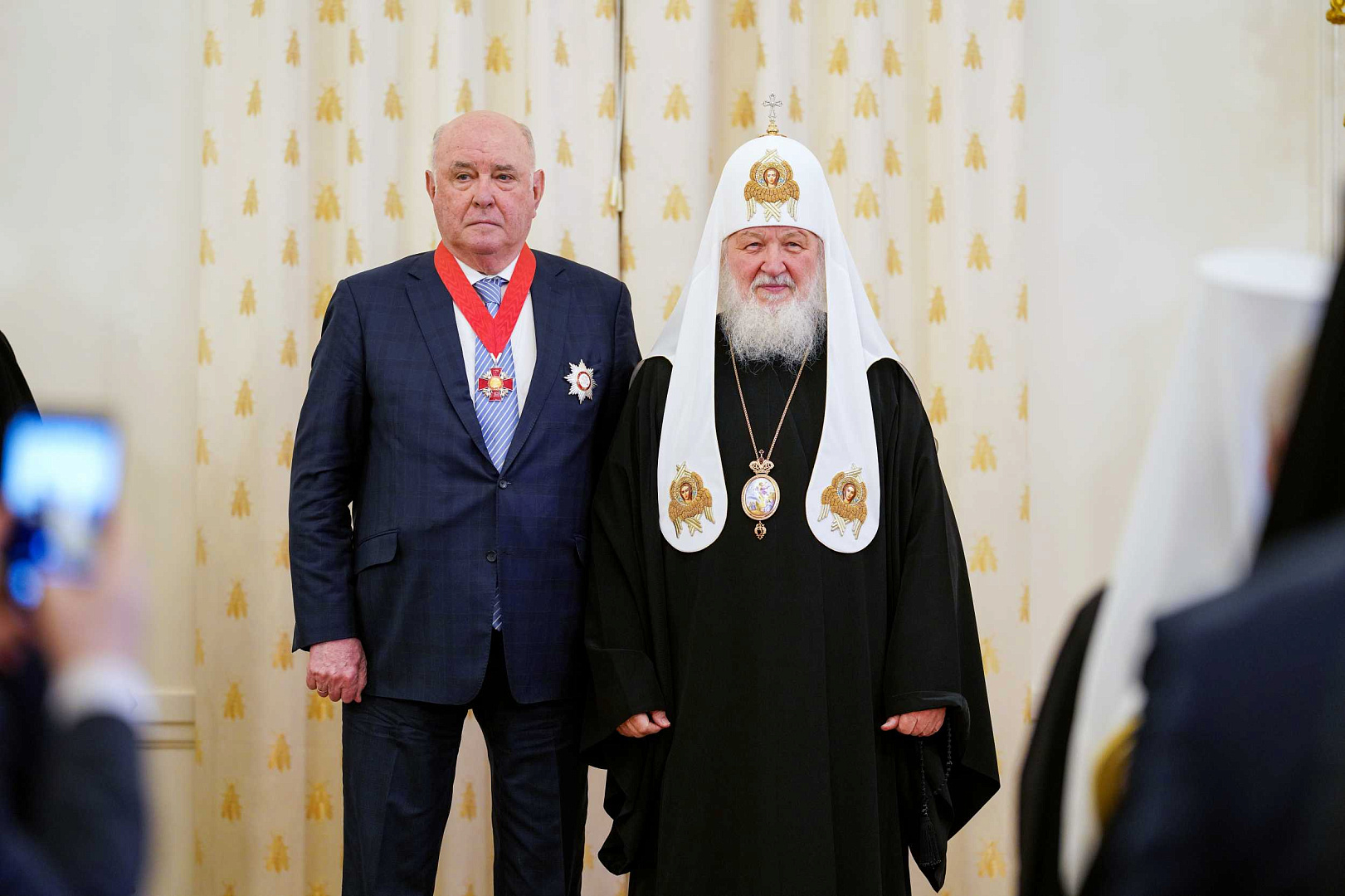
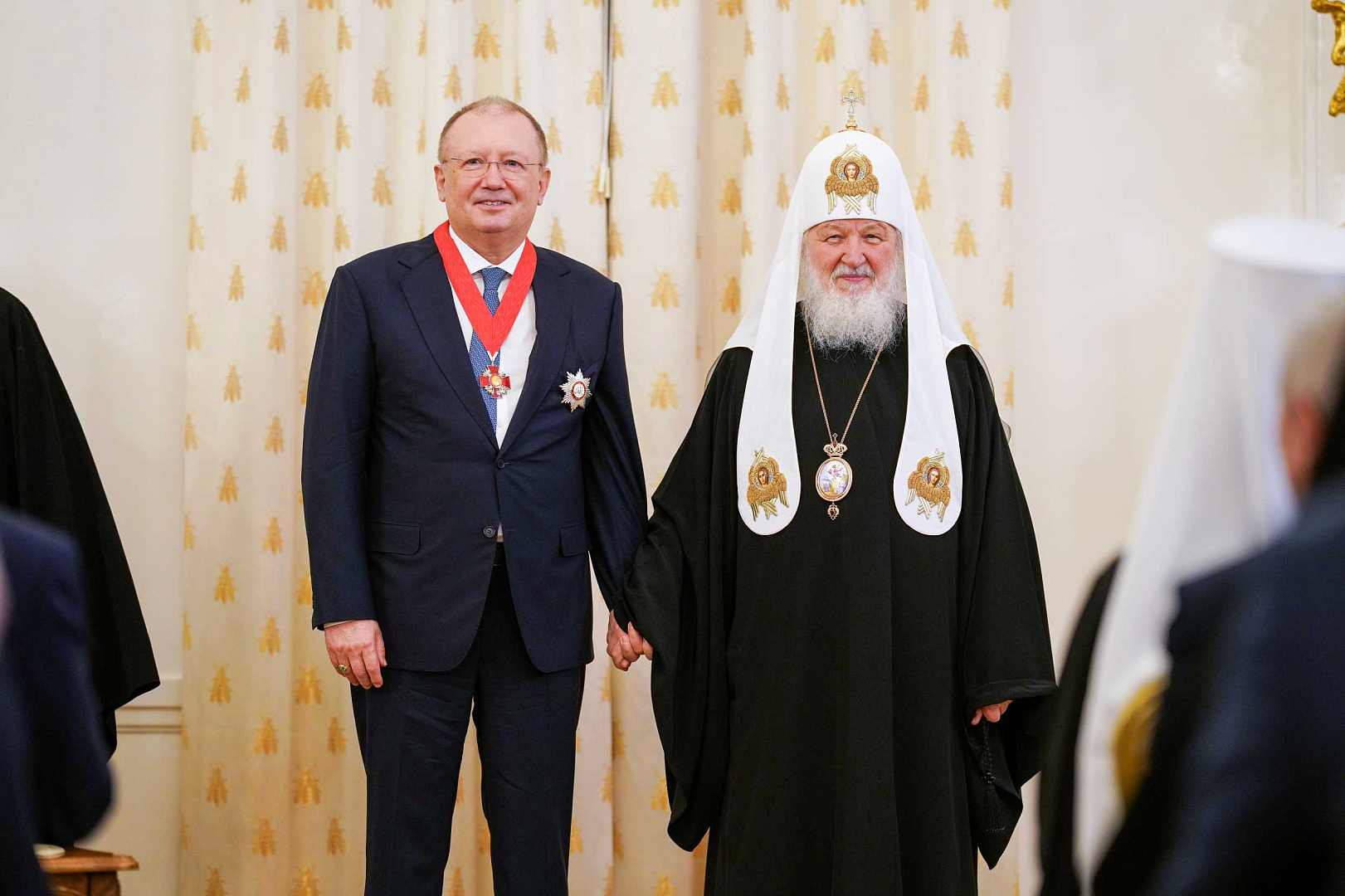
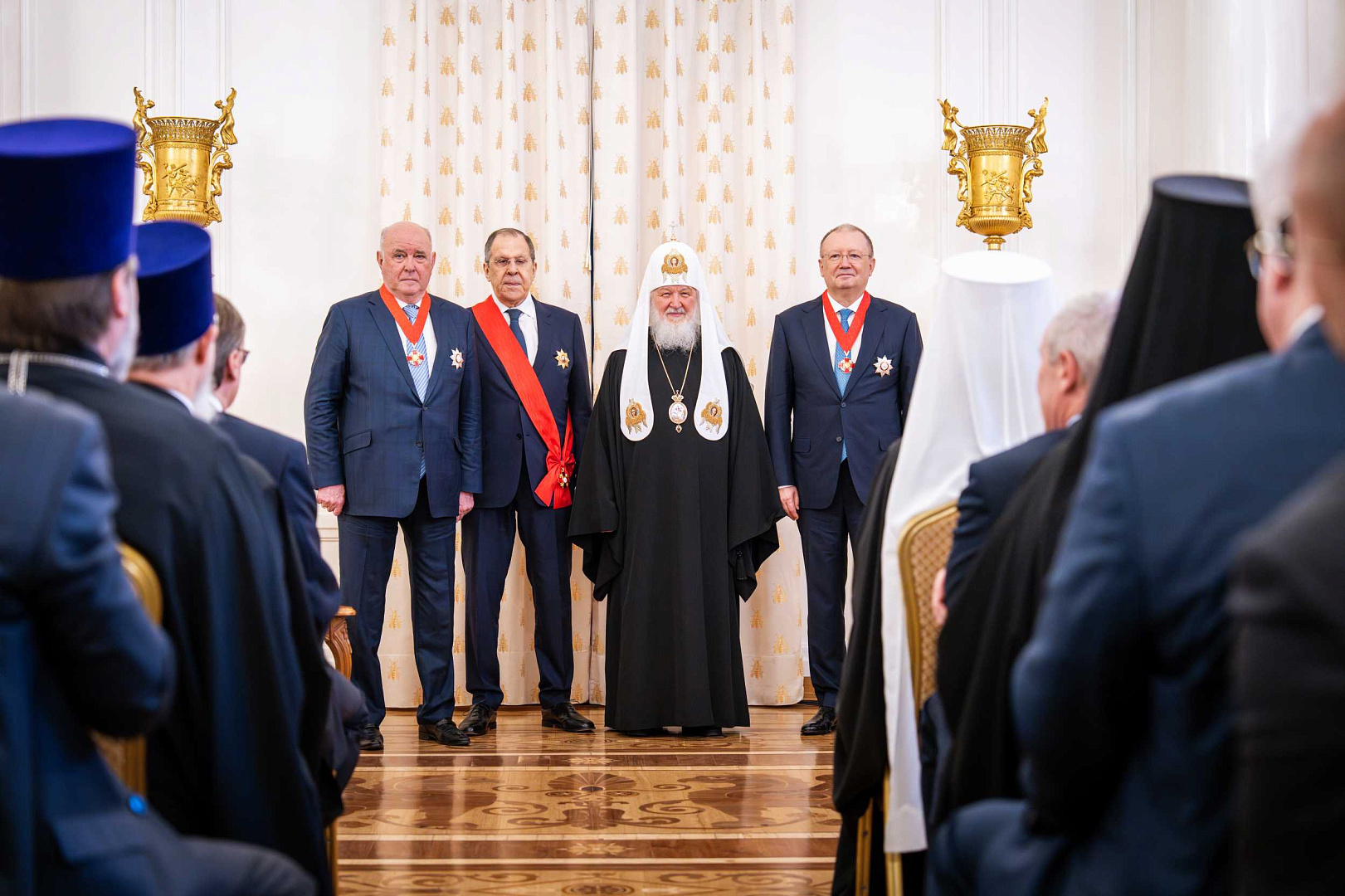
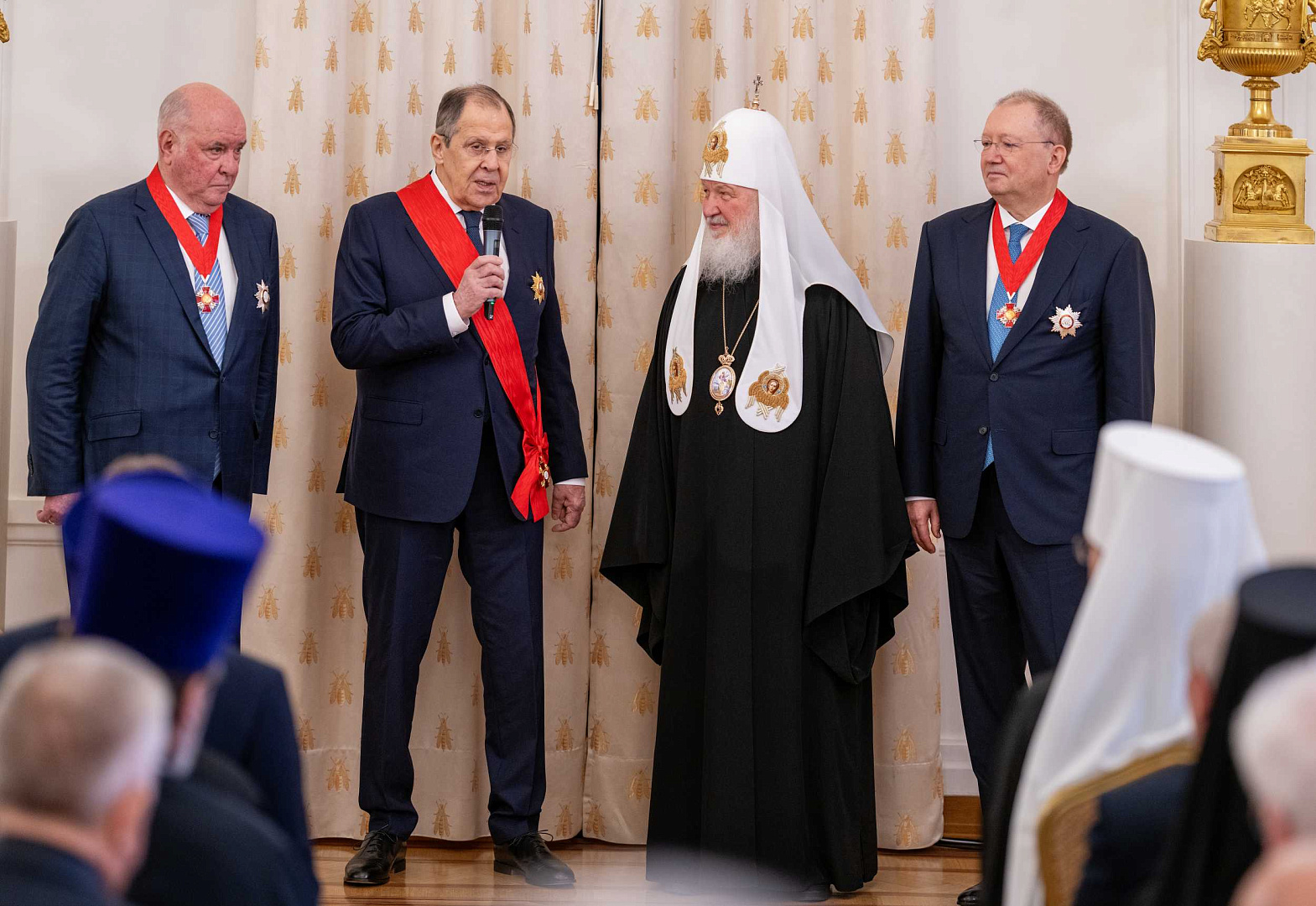
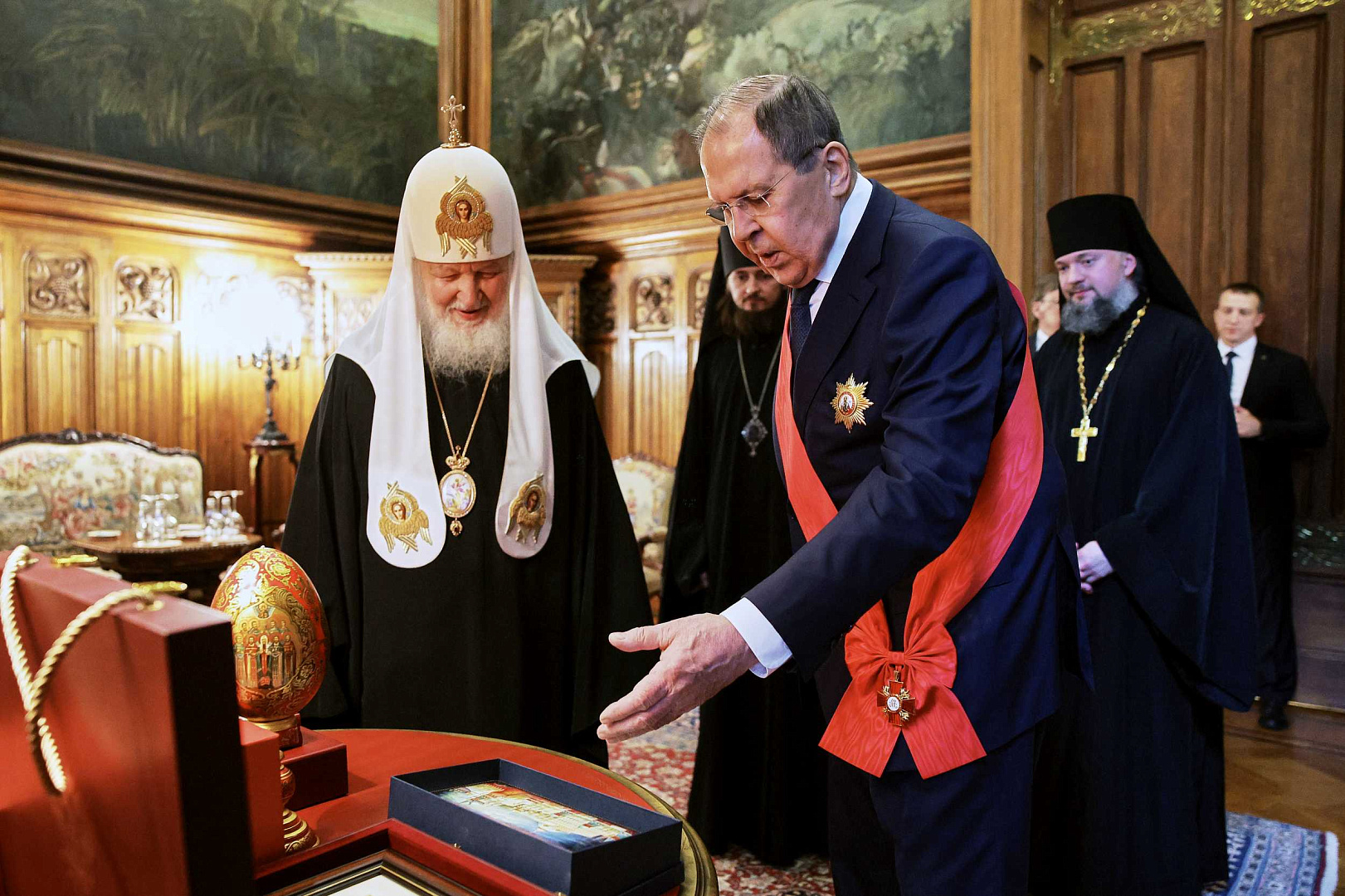
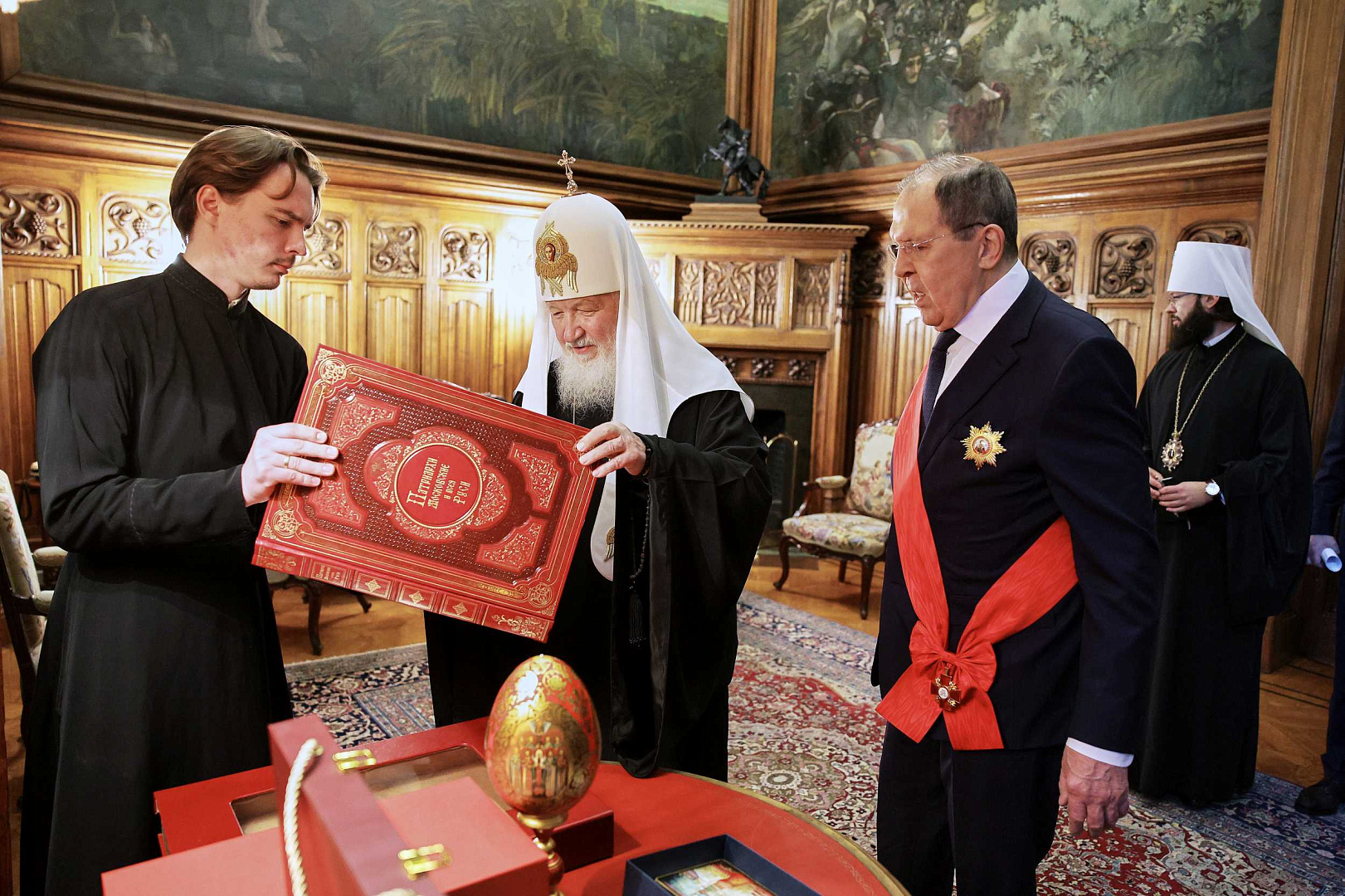
DECR Communication service, 20.05.2025.
On May 20, 2025, a solemn reception in honor of the feast of Pascha (Easter) was held in Moscow at the Grand Mansion of the Ministry of Foreign Affairs of the Russian Federation. The event was attended by religious leaders, heads of foreign diplomatic missions, Russian and foreign diplomats, as well as representatives of the Administration of the President of Russia, the Government of the Russian Federation, the Federation Council of the Federal Assembly of the Russian Federation, the State Duma of the Federal Assembly of the Russian Federation, and public organizations.
His Holiness Patriarch Kirill of Moscow and All Rus' was present at the festive gathering. The Primate of the Russian Orthodox Church was welcomed by the Minister of Foreign Affairs of the Russian Federation, S.V. Lavrov.
Representing the Russian Orthodox Church at the event were Metropolitan Anthony of Volokolamsk, Chairman of the Department for External Church Relations; Metropolitan Paul of Krutitsy and Kolomna, Head of the Moscow Patriarchate’s Administration for Dioceses in the Near Abroad; Bishop Alexy of Ramensk, Personal Secretary of the Patriarch of Moscow and All Rus'; Archpriest Nikolay Balashov, Advisor to the Patriarch of Moscow and All Rus'; Archimandrite Philaret (Bulekov), Deputy Chairman of the DECR; Archpriest Nikolay Lishcheniuk; Archpriest Igor Yakimchuk; Alexander V. Shchipkov, First Deputy Chairman of the Synodal Department for Church-Society and Media Relations; and other clergy and staff of the Department for External Church Relations.
The solemn Paschal reception was also attended by representatives of Local Orthodox Churches at the Moscow Patriarchal Throne: Archimandrite Stephen (Dispirakis) of the Jerusalem Patriarchate and Archimandrite Seraphim (Shemyatovsky) of the Orthodox Church of the Czech Lands and Slovakia.
The Moscow Synodal Choir performed Paschal hymns during the festive gathering.
Addressing the attendees at the traditional Pascchal meeting at the Ministry of Foreign Affairs, S.V. Lavrov congratulated everyone on the radiant feast of Christ’s Resurrection—"the main Orthodox holiday, a symbol of spiritual renewal, hope, and faith."
He also extended his congratulations on the occasion of the 80th anniversary of the Great Victory and particularly emphasized the role of the Russian Orthodox Church during the Great Patriotic War and in preserving the prayerful memory of the fallen soldiers.
Touching upon the situation in Ukraine, S.V. Lavrov pointed out that after the violent seizure of power in 2014, everything connected with Russia—the Russian language, culture, traditions, and Russian-language media—has been systematically eradicated. Canonical Orthodoxy has not been spared either: for many years, the largest denomination in the country, the Ukrainian Orthodox Church, has been persecuted, "brought to the brink of legal liquidation by the authorities entrenched in Kiev." "The seizure of churches, vandalism, and attacks on priests and parishioners continue unabated," the Russian Foreign Minister reminded. "Evidence of this sacrilegious policy includes the desecration of believers' feelings through so-called 'inventory and verification of the historical and scientific value of the relics of saints' in the country’s main monastery, the Kiev-Pechersk Lavra. This task has been entrusted to veterinarians." Moreover, as the Foreign Minister noted, such sacrileges are carried out with the connivance and even support of many European countries, where the specters of neo-Nazism and Satanism are rearing their heads.
"I want to assure all those present that Russia will not abandon the Orthodox people of Ukraine in their plight and will ensure that their lawful rights are respected and that canonical Orthodoxy regains its central place in the spiritual life of the people in Ukrainian lands. The guarantee that these goals will be achieved lies in the position of the Russian Federation on the just resolution of the Ukrainian crisis, created by the West," said S.V. Lavrov.
He emphasized that the Russian state, including the Ministry of Foreign Affairs, will continue to align its efforts on the international stage with those of the Russian Orthodox Church. "It is heartening to see the constructive activities of the Moscow Patriarchate expanding in many parts of the world. The Patriarchal Exarchates of Africa and Southeast Asia are developing intensively, and the number of overseas parishes is growing," the Minister stated.
"We highly value Your Holiness’s efforts to strengthen the unity of Orthodox believers in defending Christians fr om the threats of terrorism and religious fanaticism," continued S.V. Lavrov. "Of particular concern is the situation in the Middle East, especially in Syria, wh ere radical militant groups are carrying out what amounts to ethnic cleansing, mass killings based on nationality and religion."
It was also noted that the Ministry of Foreign Affairs highly appreciates the contribution of the Russian Orthodox Church to improving the global situation and preventing the deepening of divisions along ethnic and confessional lines. The readiness to further enhance cooperation "in the interests of upholding the ideals of goodness and justice and deepening broad international cooperation" was expressed.
After congratulating the attendees on the bright feast of Pascha, His Holiness Patriarch Kirill of Moscow and All Rus' thanked the Russian Ministry of Foreign Affairs for reviving the tradition of Easter gatherings, which had been interrupted due to the 2020 pandemic.
His Holiness also highlighted the significance of the 80th anniversary of the Great Victory, achieved through the heroism of soldiers and millions of home front workers. "The Russian Orthodox Church honors the memory of all who gave their lives for the freedom of our people and thanks the Lord for the gift of peace, won at such a high cost," the Patriarch said.
The Russian Orthodox Church, whose faithful include millions of people fr om various countries and all continents, continues its ministry in a rapidly changing and increasingly troubled world, His Holiness noted. Patriarch Kirill expressed deep regret over the degradation of religious life and the destruction of the family institution observed in Western countries, which represents a manifestation of the greatest value a person possesses—the gift of love. In his view, these processes pose a danger to human social cohesion, including the lives of nations and peoples.
His Holiness Patriarch Kirill also expressed profound concern over the situation in Ukraine, particularly the plight of the Ukrainian Orthodox Church, which faces the threat of legal liquidation and the actual destruction of its communities in that country. His Holiness pointed out that Western countries remain silent about the violations of the rights and religious freedoms of a vast number of people in Ukraine. Moreover, the situation is worsening: recently, a procedure was approved for inspecting religious organizations regarding their "affiliation with the Russian Orthodox Church." The authorities aim first to deprive communities of their governing centers and then liquidate the communities themselves, seizing their churches and forcibly pushing them into schism. The greatest pressure on Orthodox parishes is currently observed in the Cherkasy and Chernivtsi regions, wh ere violent seizures of churches are especially numerous and brutal.
"The Kievan authorities are concerned about the international exposure of the persecutions. Considerable resources are being spent to justify the law banning the Church, commissioned articles are published in reputable Western journals, and Ukrainian religious leaders are sent on 'tours' to the U.S. and Europe, where they claim that Ukraine is a country of religious freedom and that no persecutions are taking place," said His Holiness Patriarch Kirill of Moscow and All Rus'. "But the success of this propaganda is doubtful. International human rights efforts are creating problems for the Ukrainian authorities, preventing them fr om proceeding with the final destruction of Orthodoxy in their country. Therefore, all those working in this direction, even if immediate results are not visible, must understand that this is one of the factors capable of stopping the destruction of one of the largest religious communities in the world."
As His Holiness Patriarch Kirill noted, "programs of persecution against our Church, initiated by anti-Russian forces in Western countries, are now being attempted not only in Ukraine but also in Moldova and the Baltic states, particularly Estonia." For instance, on April 9, 2025, the Estonian parliament adopted amendments to the Churches and Congregations Act, outlawing the structures of the Moscow Patriarchate in the country.
"And wh ere did Orthodoxy in Estonia come from? Not from China or Paris. It is Russian Orthodoxy, and generation after generation, Orthodox people were raised in this system of values, attending the churches of the Russian Orthodox Church," emphasized His Holiness. "And now, before the eyes of all Europe, not some recently emerged dubious religious community but one to which a significant portion—and at one point in history, the majority—of those living in Estonia belonged for centuries, is being subjected to attempts to erase it from the spiritual and cultural life of the country. By adopting amendments to the Churches and Congregations Act that outlaw the structures of the Moscow Patriarchate, the Estonian authorities hope to force Orthodox believers to switch to the jurisdiction of the Patriarchate of Constantinople. Although the law has not been approved by President Alar Karis due to its contradiction with the Estonian Constitution and has been sent back for revision, the threat of its adoption with minor amendments remains."
His Holiness also noted that in Lithuania, the authorities continue preparing to implement the Estonian scenario. In Latvia, the parliament hastily proclaimed the "autocephaly" of the Orthodox Church, despite the legal separation of Church and state in the country. "This is a clear violation of religious rights and freedoms, as well as the country’s Constitution. And what? Absolute silence. But we must not remain silent—neither at the level of public organizations nor at the state level. This must be spoken about, including on international platforms," Patriarch Kirill asserted. "This is an egregious case of trampling on human rights, religious freedoms, and the violation of national legislation for the sake of creating a system of oppression against a specific (and in this case, the largest) religious community."
In Moldova, against the backdrop of the authorities’ patronage of the so-called Bessarabian Metropolis of the Romanian Patriarchate, political pressure on the hierarchs of the Orthodox Church of Moldova has intensified. For example, during Holy Week, border services prevented Archbishop Marchel of Bălți and Fălești from flying to the Holy Land to receive the Holy Fire. Clergy are subjected to humiliating searches and interrogations when crossing the state border.
"These manifestations of blatant discrimination faced by our faithful demand an adequate response and fair assessment from the international community," stated the Primate of the Russian Orthodox Church. "And I would like to note that in dialogue with the leaders and representatives of many global Christian and other religious communities, the Russian Church encounters understanding of its concerns and a willingness to work together to defend freedom of religion."
In his speech, His Holiness Patriarch Kirill touched upon the topic of inter-Christian contacts, particularly relations with the Roman Catholic Church. He also noted that relations with a number of Protestant communities in Europe are in crisis due to their significant departure from Christian foundations of life and secularization. At the same time, His Holiness observed that Christian communities in the Global South largely adhere to traditional views on family and social morality.
"Our Church’s cooperation with the Ancieint Oriental Churches is of a trusting and significant nature," the Patriarch continued. "Their leaders and high-ranking representatives have spoken in support of canonical Orthodoxy in Ukraine and condemned discriminatory measures against our Church."
He also pointed out that the development of relations with the Ancient Oriental Churches—present in Armenia, Egypt, Syria, Lebanon, Iraq, India, Ethiopia, and Eritrea—is an important factor in strengthening Russia’s and the Russian Church’s ties with the peoples and religious groups of these countries.
His Holiness Patriarch Kirill spoke about the work of the Christian Interconfessional Advisory Committee, which helps various Christian denominations in the post-Soviet space build trusting relationships and coordinate positions on pressing issues of modern life. He also mentioned the broad dialogue with leaders and organizations of non-Christian traditional religions in the near and far abroad, as well as the Russian Orthodox Church’s contribution to maintaining intercultural and interreligious communication.
"At all times, it has not been easy to follow God’s commandments. But it is precisely this ability and determination of a person that helps transform the world around us on the foundations of faith, goodness, mercy, honest labor, constructive work, and mutually respectful relations among peoples," concluded the Primate of the Russian Orthodox Church.
During the event, Patriarchal awards were presented to several Russian diplomats.
In recognition of his contribution to the development of church-state relations and on the occasion of his 75th birthday, Russian Foreign Minister S.V. Lavrov was awarded the Order of the Holy Prince Alexander Nevsky (First Class).
The Order of the Holy Prince Alexander Nevsky (Second Class) was bestowed upon G.B. Karasin, Chairman of the Federation Council Committee on International Affairs, in recognition of his contribution to the development of church-state relations and on the occasion of his 75th birthday.
A.V. Yakovenko, Head of the Committee on Global Issues of International Security of the Scientific and Expert Council of the Security Council of the Russian Federation, Deputy Director General of Rossiya Segodnya International News Agency, and Ambassador Extraordinary and Plenipotentiary, was awarded the Order of the Holy Prince Alexander Nevsky (Second Class). He received this ecclesiastical award in recognition of his contribution to the development of church-state relations and on the occasion of his 70th birthday.
